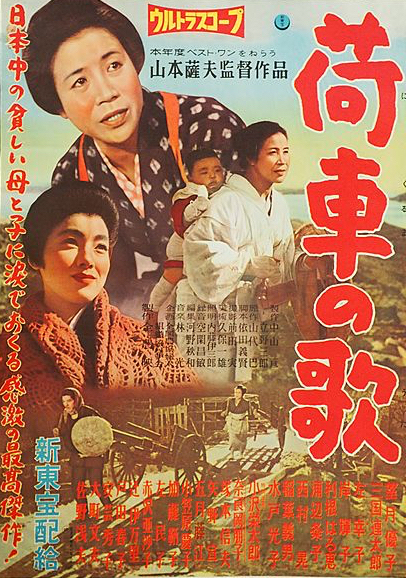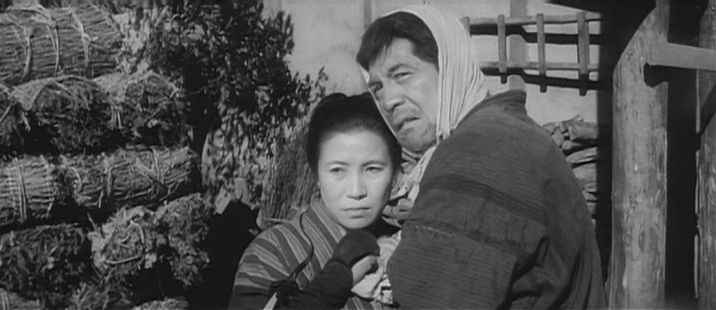
“When all human beings acknowledge each other as human let the precious joy that results be universal. When this joy lives forever in the hearts of women and is handed down to daughters who become mothers then tomorrow will not just repeat today but be a new beginning” reads the opening title card/mission statement of Satsuo Yamamoto’s chronicle of early 20th century Japan. Told though the eyes of one very good woman wrestling against her baser instincts, Song of the Cart (荷車の歌, Niguruma no Uta) is a gentle plea for a little more empathy and understanding in which the heroine suffers greatly but is finally rewarded in managing to keep the darkness at bay.
In late Meiji, Seki (Yuko Mochizuki) develops a fondness for the most eligible young man in town – the postman, Moichi (Rentaro Mikuni), who can read and write and isn’t bad looking either. To her surprise, Moichi admires her too and eventually proposes marriage, intending to give up his job as a postman which doesn’t pay as much as it used to now costs are rising because of the recently concluded Sino-Japanese war to buy a handcart with the longterm goal of building a small handcart empire with a warehouse of his own that will allow him to build a fancy house to live in. Seki hesitates, she’s an illiterate maid perhaps she isn’t good enough for the great Moichi but he replies that he couldn’t care less about that and only wants to know if she wants him. She does, but has to check with her parents first. They object to the marriage on the grounds that Moichi is penniless and disown her when she tells them she’s marrying him anyway. Disowned by her parents, she also loses her job as a maid and is forced to head to Moichi’s ahead of schedule where his extremely cold mother (Teruko Kishi) makes no secret of her resentment of her new daughter-in-law but is eventually forced to relent.
Unlike Moichi and his mother, the other residents of the village and particularly its women are bright and cheerful despite the harshness of their lives. Swept off her feet by Moichi’s seeming sophistication, Seki is in for a rude awakening in realising that his work ethic is extreme and in many ways he’s just as cruel as his heartless mother. On her arrival, Seki’s mother-in-law complains that she brings “only a small bundle” while simultaneously suggesting that she somehow looks down on them because they are only poor people, insisting that she work alongside Moichi pulling carts to make their dreams of riches come true. Seki jumps at the chance to prove her love, but finds her mother-in-law unchanged.
Pulling the cart through the village, Moichi and Seki pass another woman who seems put out by Seki’s presence, complaining that Moichi never bothered to reply to her own proposal. Moichi dismisses her complaints, avowing that he didn’t marry her because she wasn’t a worker, implying that he was only interested in someone who would work alongside him in pursuit of his goal of becoming a homeowner. Seki is indeed a worker, and a strong woman who bears her hardships with grace, but finds it increasingly difficult to put up with her mother-in-law’s heartlessness and adherence to old-fashioned feudal customs by which she claims her authority over the household while Moichi, as the dutiful son, always defers to his mother. When the first child arrives, Moichi declares that a daughter brings him no joy, while the mother-in-law who is supposed to be watching her, just lets her cry all day long and doesn’t even change her nappies. Out on the road, Seki comes across another couple in a similar situation who’ve brought their little one with them, riding in a bucket on the back of the cart. Seki wonders why they can’t do the same, then she’d at least know her daughter was alright and not crying her heart out in a dirty nappy, but Moichi won’t hear of it lest his mother be offended that Seki is suggesting she’s not looking after her granddaughter properly.
Moichi works every hour god sends, but not so much to provide for his family as to improve his own status in the hope of owning a sizeable home, perhaps to “regain” the kind of position his mother thinks is theirs as descendents of the Heike. He exists on a kind of political fault line in his rigid austerity, believing that you really can make it just by working hard while also becoming the de facto spokesman for the other cartmen because he is the only one able to read and write. Yet faced with constant and obvious oppression of the eerily feudal kind in persistent rice profiteering he does nothing much to resist it and gives only grudging approval to his son’s intention of forming a train driver’s union.
While Moichi has pinned all his hopes on handcarts, the future is fast approaching. A funeral procession of cartmen is greeted by the horse-drawn variety coming the other way as if to signal their imminent obsolescence. But the horsemen aren’t much better off. If Moichi couldn’t afford a horse, he’ll never afford a motor car and the mechanised age is on the horizon. The only work he manages to find ironically involves transporting lumber for the new railway line, but it’s a gamble that pays off and makes Moichi a wealthy man once again.
Material comforts aren’t everything, however, and Seki struggles to reconcile herself to life with her increasing cruel mother-in-law and emotionally distant husband. She worries that she’s becoming what she hates, finding it difficult to find sympathy for Moichi’s mother now she’s ill in feeling that perhaps she’s getting what she deserves. Her friend advises her that that’s just “bugs” eating away at her heart and what she really needs to do is fly in the opposite direction, finally make a friend of her mother-in-law in trying to understand her. She has, after all, had a very hard life, starved of affection all these years as a young widow raising a son alone on little more than charcoal money.
Seki meanwhile suffers numerous humiliations and heartbreaks, notably Moichi’s extremely unreasonable decision to bring his 50-year-old sex worker mistress to live with them in their home, but does her best to be generous and forgiving. As she points out, this house is half hers, she built it alongside Moichi and she won’t just vacate it so Moichi can do what he always does which is as he pleases (once his mother’s not around to tell him not to). Moichi perhaps pays for his feudalist follies and selfish authoritarianism in a fairly direct way which aligns him with his chastened nation waking up to the emotional costs of his mistakes, while Seki is finally rewarded. Unlike her mother-in-law she becomes a beloved neighbourhood granny giving rides to all the local kids while pulling her cart onwards towards the future like a reverse Mother Courage embracing her long absent son finally returned to her in recognition of her goodness.
